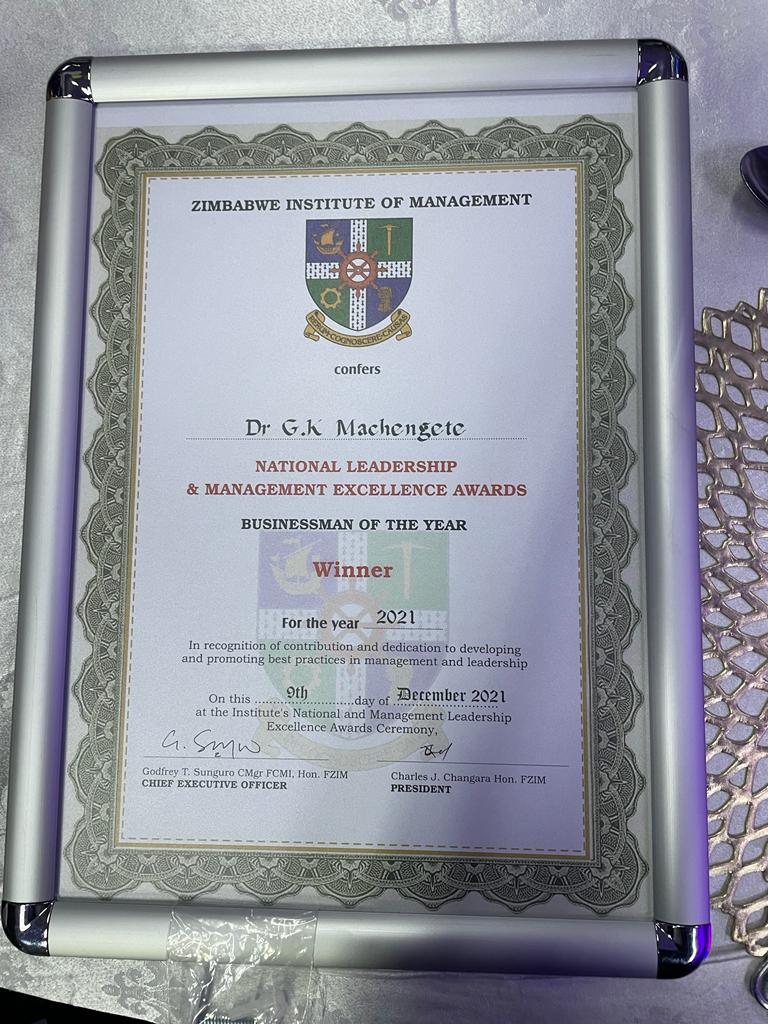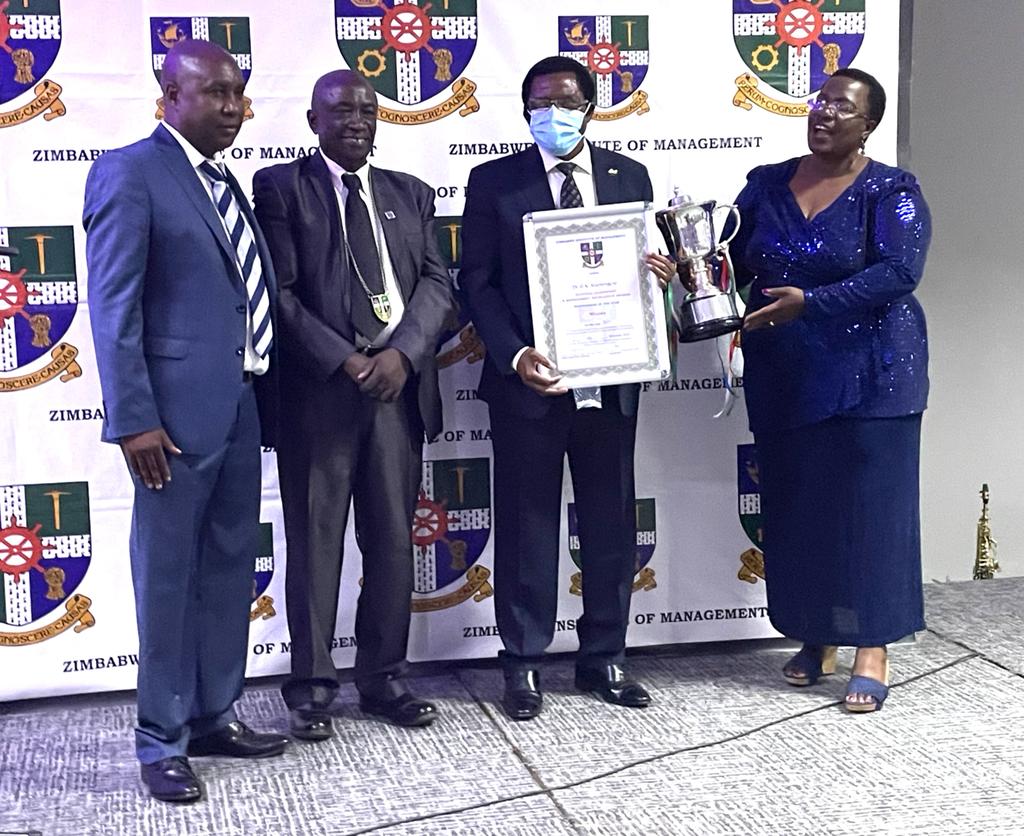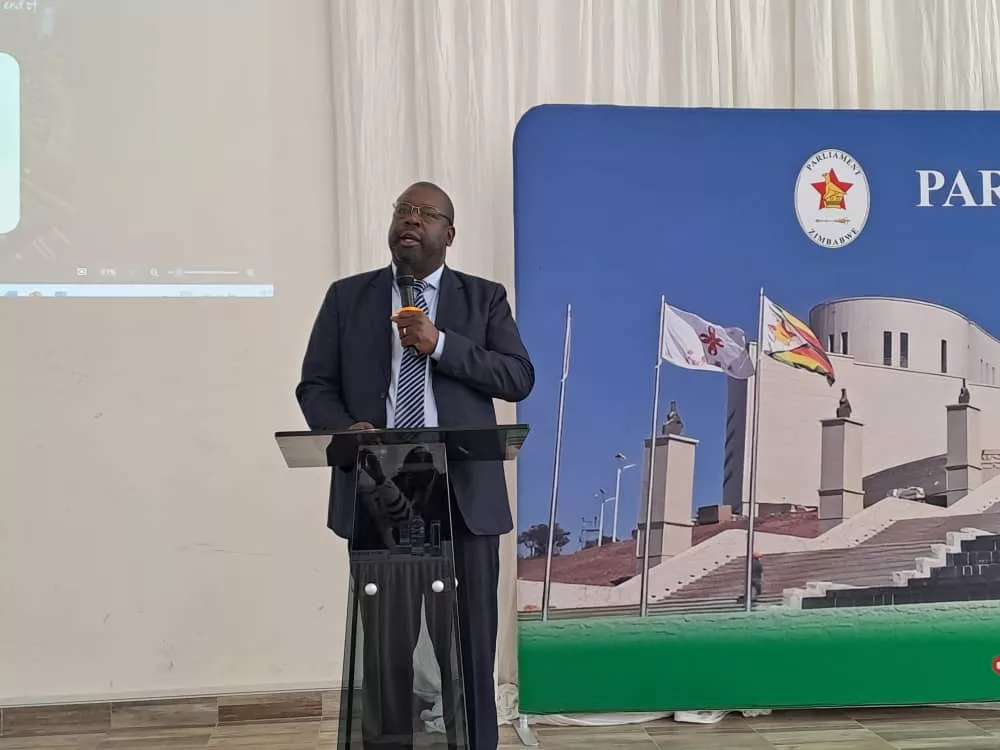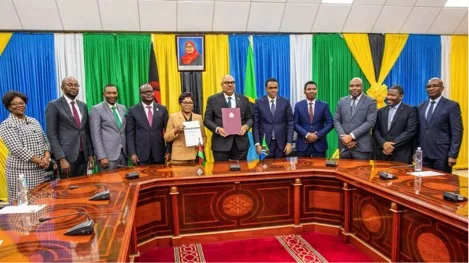|
Getting your Trinity Audio player ready...
|
Dr. Gift Machengete, the Director-General of the Postal and Telecommunication Regulatory Authority of Zimbabwe (POTRAZ) has won the coveted National Leadership and Management Excellence Award offered by the reputable Zimbabwe Institute of Management.

Below, Spiked Online Media profiles the immense achievements of Dr. Gift Machengete:
Resume & Leadership
History of POTRAZ
POTRAZ was created by an Act of Parliament in 2001 following the unbundling of the Posts and Telecommunications Cooperation (PTC). PTC acted as both an operator and regulator, hence in line with best practice and tenants of good governance, the regulatory functions were struck off PTC, while three companies were formed from the organization that is Netone, TelOne, and ZIMPOST.
Responsibility
As Director-General of POTRAZ, his responsibility is to ensure that the Authority meets its mandate which is as follows: Licensing, Consumer Protection, Regulation, and Provision of Universal Access to postal and telecommunication services.
The DGs Profile
- Dr. Machengete is a holder of a Bachelor of Science Degree in Economics from the University of Zimbabwe and a Diploma in Purchasing and Supply from Harare Polytechnic.
- He also holds a Master of Business Administration Degree (MBA) from Southern Cross University, Australia, and a Doctorate in Business Administration from the same university, for which he graduated with distinction and was awarded the University Plaque for outstanding achievement.
- He has over thirty (30) years of working experience in civil service, having started his career in 1981 as a Magisterial Assistant in the Ministry of Justice. In 1982 he left for University and rejoined Government in 1985 as Research Economist.
- Between 1991 and 1995 he was deployed to China as the Economic Counsellor at the Zimbabwe Embassy, where he is credited for improving Sino-Zimbabwe relations as a Diplomat in that country.
- Between 1995 and 2001 he was a Senior Economist and the Head of Co-ordination and Secretariat in the Government of Zimbabwe.
- In 2001, he was deployed to Malaysia as Zimbabwe’s Deputy Ambassador to that country. During that time, he was involved in creating ICT awareness in Zimbabwe.
- Upon his return to Zimbabwe in January 2006, he was deployed to the Office of the President as an Assistant Director for Planning and Coordination.
- Dr. Machengete was promoted to the position of Deputy Director Administration and further elevated to the position of Director Administration in 2011 in the Office of the President
- In 2016, he retired as Deputy Director-General before assuming office as POTRAZ Director-General.
- He is one of the first lecturers for the Masters in Business Leadership Degree programme for Bindura University of Science Education (BUSE), where he taught Business Research Methods and Marketing Management courses from 2008 to 2016.
- He is currently lecturing in the Masters in Security and Intelligence for the same University. He is also a Research Thesis Moderator at the same University.
- Dr. Machengete served on the Boards of the Traffic Safety Council of Zimbabwe (TSCZ) Board, where he was Acting Chairman, the Grain Marketing Board (GMB) and Sino Zimbabwe, where he was Vice-Chairman.
- He was the Chairman of the African Advanced Level Telecommunications Institute (AFRALTI) Governing Council between March 2018 to February 2019.
- He is the current Chairman of the Communications Regulatory Authority of Southern Africa (CRASA).
Achievements in 2021
In line with Infrastructure Sharing Regulations, Dr. Machengete mooted the tower relocation project to create shared sites. Under this project, collocated towers are relocated to unserved areas so that only one tower remains per site, therefore contributing to cost-effective network expansion into rural areas. All three Mobile Network Operators (MNOs), Econet, Netone, and Telecel are involved in this project and have been working closely in derigging and relocation, with relocation costs being borne by POTRAZ.
In 2021, a tower relocation pilot project saw the identification of 3 sites with collocated towers. He ensured that operators agreed to coexist on one tower resulting in 4 new sites being created which are Musambakaruma, Katumbama, Mapolisa, and Cranharm, utilizing old infrastructure. The tower relocation project has given a lot of momentum for network expansion into underserved areas while utilizing existing infrastructure. This has also improved business working relationships among operators who are now working for the good of the country while expanding their networks through these initiatives.
The relocation project is cost-effective because the country uses existing infrastructure investment to expand its networks thereby serving the country the much-needed foreign currency by just relocating existing towers. In 2022, he will ensure that more sites are relocated using this model. This project will help improve services in the telecommunications sector in a cost-effective manner by relocating collocated towers dotted around the country.
In 2021, Dr. Machengete ensured that implementation of the Telecommunications Traffic Monitoring System (TTMS) began. Installation of the system is now underway. The system will be commissioned in December 2021. The TTMS is meant to digitize traffic data collection to avoid relying on operator data for important national statistics.
It is also Zimbabwe’s obligation to the International Telecommunications Union (ITU) to supply correct statistics at the international level. This system will help contribute immensely to the digital economy as the collection of traffic data is now digital. Hence, contributing towards vision 2030. In the past ZIMRA relied on profit declarations by Operators, this revenue reporting system is subject to manipulation. Through the TTMS, the government can now calculate profits realized by each operator by monitoring volumes of in and outbound traffic without accessing the content of the traffic. The government will be assured of correct revenues from operators through this system, hence the system will help improve government tax revenue collection. More taxes for the government will help contribute to Zimbabwe’s economic development.
The POTRAZ Director Genera oversaw the implementation of the Electromagnetic Frequency Project (EMF). POTRAZ procured the equipment in 2021, training on the use of the equipment was done and the Authority now has full capability to measure electromagnetic emissions at radio sites, hence ensuring compliance of such sites with World Health Organization standards as well as the International Commission on Non-Ionizing Radiation Protection. This helps in ensuring improvement in the country’s radio systems and the provision of health-friendly technologies. Adoption of health-friendly services helps in improving the quality of services that the telecommunications sector provides to the public.
Under his leadership, POTRAZ implemented the National Emergency Response Centre in 2021 to comply with International Emergency Response Standards. This project directly contributes to NDS1’s Digital Economy pillar in that Zimbabwe’s emergency response will be digitalized through international codes 911 & 112. This project will have a social impact on Zimbabweans as it creates a conducive environment for effective emergency response mechanisms at the national level thus helping Zimbabwe’s emergency telecommunication standards to compete at a global level.
In 2021, Dr. Machengete ensured that the Converged Licensing Framework was implemented for Zimbabwe to align with international standards. The Converged Licensing framework is technology and service neutral in line with international trends. This has seen the introduction of Mobile Virtual Network Operators (MVNOs), which will allow more sector players in the mobile network space. Those interested in rolling out infrastructure only can now operate under an infrastructure license while those who are interested in rolling out both network services and infrastructure can apply for a unified license. On the Postal front, more licenses have also been introduced such as small courier operators commonly known as Malaicha’s can now be licensed so that they operate legally.
During the year, the Authority issued an Internet Service Provider licence to Fibre Connections which is installing transit fibre from Plumtree to Chirundu. Under the license, the operator will provide Internet services to clients along their route and as part of their rollout obligations, Fibre Connections will provide connectivity to some rural communities and institutions along the route.
In 2021 the Authority also issued a Spectrum Access licence to ZIMPLATS for their underground mining operations which are being managed through the Internet of Things (IoT) applications.
In terms of regulation, Dr. Machengete ensured that there is an even playing field for all operators. Complaints that government-owned operators were being favored ahead of private players have since disappeared. He also managed to strike the delicate balance between operator viability and consumer affordability by keeping tariffs affordable to cushion consumers, while ensuring that the tariffs remain viable enough to allow telecommunications operators to be profitable.
As the country races towards the adoption of 5G, the POTRAZ Director General superintended over the adoption of the National Frequency Allocation Plan in line with World Radio Conference 19 Standards (WRC19 standards). The main highlights of which are the identification of spectrum bands for 5G. This is the latest evolution of mobile communications offering ultra-high broadband with massive machine-type communication and ultra-low latency communication. This identification means that Zimbabwe is ready for 5G implementation. Next is the assignment of 5G spectrum to operators when they are capital ready for 5G implementation. This is expected to happen as early as 2022. This rollout is a critical path towards a digitized economy by year 2030.
In 2021, he began the process of implementing an Enterprise Resource Planning System (ERP) system to digitize its system in line with NDS1’s Digital Economy pillar. Procurement of the system is now at the Special Oversight Committee (SPOC) at PRAZ for approval. Once that is done, POTRAZ will implement the project in 2022.
Changes instituted in 2021
To protect employees against COVID – 19, Dr. Machengete implemented the Work From Home Policy, where employees and Board members were capacitated with ICT equipment and data to enable them to work from home. As such, meetings and training were mostly done virtually. he stopped the transmission of physical documents as this contributes to the spread of COVID–19. Instead, all documents were transmitted electronically with electronic signatures being used on documents that required signing.
Vision
In response to convergence, Dr. Machengete’s vision is to see the creation of a unified regulatory environment based on collaborative regulation so as to promote regulatory efficiency. Under this unified regulatory approach, he envisions seeing the country become a pacesetter in terms of regulation by creating home-grown regulatory tools and strategies based on research, training, and innovation.
His sector-specific vision is that the Authority should not only maintain a fair and enabling regulatory environment, but champion accelerated development of the ICT sector hinged on improved ICT access and use by unserved and underserved communities. Such enhanced access and use should be supported not only by Universal Service Funds but by Infrastructure sharing, private-public partnerships, and community initiatives as well.
Service Improvement Initiatives and Innovation
New products or services
The Authority adopted the Converged licensing framework that is technology and service neutral which saw the licensing of new players and the establishment of Community Information Centres, and Community Networks, mostly in rural areas.
New systems and technologies:
Dr. Machengete established the Harare Emergency Response Centre which is now operational. The Authority is working on the operationalisation of the Harare Internet Exchange Point to ensure that all Internet Access Providers are interconnected so as to reduce the cost of Internet connectivity.
Partnerships
Under Dr Machengete’s leadership, the Authority partnered ZIMSTAT to conduct the 2020 ICT Access by Households and Use by Individuals Survey, the report of which was disseminated on 29 September 2021.
POTRAZ worked on an MoU with the Research Council of Zimbabwe which aims at supporting and funding research programs for the ICT sector, including consumer protection issues.
POTRAZ also partnered with the International Telecommunication Union to develop a recommendation on Consumer protection for Over-The-Top services (OTTs)
Additionally, the Authority partnered with the ITU, RBZ to develop a framework for digital financial services security and consumer education on the same.
He believes in eradicating the silo mentality and embracing collaborative regulations among regulators since most of our products and regulatory tools are now all ICT-based.
Customer service charter:
During the year, the POTRAZ Director-General took a proactive stance in protecting consumer interests by enforcing the requirement that all Service Providers have Service Charters that must be approved by the Authority. They should be in accordance with the Authority’s 2015 Customer Service Guidelines.
The Authority also initiated the process of hiring a consultant to conduct the 2022 Consumer Satisfaction Survey. A request for proposal has already been issued to select the consultant.
To improve ICT access during the Covid19 Pandemic, POTRAZ, under his leadership released spectrum to Operators which helped to enhance migrations of business from physical to virtual platforms.
Innovation
To contribute towards an innovation culture in the country’s ICT sector, POTRAZ, under his leadership, ran 2 Hackathon competitions in September and October 2021. The two events were conducted virtually considering the COVID-19 Pandemic and were held under the theme “#POTRAZ@20Challenge”.
The first Hackathon focused on a COVID-19 and ran under the sub-theme “Towards a Digital Economy in a Covid-19 Zimbabwe”. This Hackathon was aimed at proffering sustainable solutions that make use of Information Communication Technologies (ICTs) to mitigate the disruptions caused by the COVID-19 Pandemic on different human endeavours in the health, education, agriculture, industry, and commercial sectors. Applications aimed at minimizing the spread, coordinating response mechanisms, and promoting public awareness, of the COVID-19 Pandemic were also considered for support under this Hackathon.
The second Hackathon focused on agriculture and ran under the sub-theme “Towards vision 2030 with Agric-tech”. This Hackathon was aimed at proffering solutions to address the problem of low average agricultural yields and low production (too much idle land), in the country. This also enables Zimbabwe to create its own pool of innovators that will help Zimbabwe achieve the Smart Agriculture Initiative. Under the Smart Africa initiative, to which Zimbabwe is expected to champion Smart Agriculture for Africa. As Zimbabwe Launched the Zimbabwe Agritech Strategy on 29 November 2021, POTRAZ’s hackathons will provide initiatives by the youths towards achieving this important milestone.
A total of 60 teams participated in the 2 Hackathons which resulted in 10 of them qualifying for awards amounting to a combined ZWL40,000,000 to further develop their projects which are aimed at improving the contributions of these two critical areas to the socio-economic development of the country. Winners of the 2 competitions are currently rolling out their projects. To assist the innovators to develop their projects to commercialisation stage, he introduced a mentorship and incubation programme that is aimed at equipping the innovators with the necessary skills and knowledge to establish and run their businesses successfully.
Operational Growth & Profitability
Dr. Machengete superintended over the efficient utilization of financial resources by POTRAZ and USF in line with Board-approved budget allocations and board-approved budget variations and supplementary budgets.
The Authority’s 2020 financial statements were audited by the Auditor General. POTRAZ and USF did not have issues with the Auditor General as funds were used in line with Public Finance Management Act, Public Entities and Corporate Governance Act and strict adherence to Board Approved Internal Policies. The Authority’s staff to income ratio averaged 18% as of October 2021, while PECOG requires that the Authority maintains an average of 30%.
As part of efficient management of financial resources, the Authority ensured that funds awaiting deployment to projects were invested in short-term investments. For 2021, POTRAZ and USF will add to the fee generated revenue over ZWL600m in investment income which will help to augment POTRAZ and USF finances.
The Authority’s revenues grew from 1,4bn in 2020 to ZWL4.4bn in 2021.
Service Standards & Quality
Under Dr. Machengete’s leadership, POTRAZ implemented the National Frequency Allocation Plan in line with World Radio Conference 19 (WRC19) standards. Before the adoption of 5G, POTRAZ is required to ensure that the WRC19 standards are adopted to ensure safety of our citizens.
Under his leadership, POTRAZ implemented the Electromagnetic Frequency Project (EMF). The Authority procured the equipment in 2021, training on the use of the equipment was done and the Authority now has full capability to measure electromagnetic emissions at radio sites ensuring compliance of such sites with World Health Organization standards as well as the International Commission on Non-Ionizing Radiation Protection.
This year, under Dr. Machengete’s leadership, the Authority procured the Automated Postal Service Quality of Service Monitoring system, which monitored issues such as mail and parcel delivery period and package handling among other things. This will improve the Authority’s quality of service enforcement mechanisms.
Personal Development
Dr. Machengete undertook a course in ICT Policy and Regulation which was offered by Wits University, South Africa, in 2021.
As a lecturer at Bindura University, he taught Research Methodology during the reporting period. While this personally developed him, he contributed to the country’s human and capital development initiatives.
Social Responsibility
On Environmental Management & Control Projects, the Tower Relocation Project comes back as one of my effective projects in ensuring effective environmental management. This is because when three towers are co-existing, there will be three towers each having its own generator for alternative power supply. With the Relocation Project, it is now one generator per site, where 3 Operators are collocated. The other generators and towers are deployed to other sites where there is no network coverage. Therefore, this impacts positively on our environment through the reduction of carbon footprint of the telecommunications sector.
On the other hand, he also pushed for the adoption of solar powered passive infrastructure. To this end, some of the sites that are being relocated will be powered by solar.
POTRAZ implemented the Electromagnetic Frequency Project (EMF). The Authority procured the equipment in 2021, training on the use of the equipment was done and the Authority now have full capability to measure electromagnetic emissions at radio sites ensuring compliance of such sites with World Health Organization standards as well as International Commission on Non-Ionizing Radiation Protection. The EMF system will help in monitoring and managing radio emissions from the telecommunications sector.
Community Information Centres
During the year, the Authority operationalized eight (8) containerized village information centres which brought connectivity to the rural populace of Zimbabwe. This is in line with NDS1 of ensuring a digitized economy as this will ensure that our rural population is connected and financially included. Such initiatives, bring about financial inclusion and digital literacy to those previously left behind. A total of 169 Community Information Centres have been set up to date and 144 of these are already operational.
E-Health Project
The aim of this project is to provide connectivity to rural and marginalised health centres to enable linking of these centres to the Ministry of Health and Child Care’s Electronic Health Record (EHR) system. This will result in a centralised document management system which is expected to improve the social health delivery system in the country.
Thirty (30) rural health centres have been connected this year against the original target of twenty-four (24). The target for the year was therefore exceeded. Having met and exceeded the target for 2021, the Authority embarked on another project that will see an additional 1322 sites connected and provided with twelve months bandwidth subscription. The procurement process for the 1322 sites commenced and is at an advanced stage.
ICTs For People with Disabilities and People with Special Needs
The Authority, under Dr Machengete’s leadership, promoted digital inclusion among people with special needs by addressing the shortage of ICT and assistive gadgets in institutions catering for people with disabilities and special needs. The target for 2021 was to equip six (6) institutions catering for People with Disabilities (PwDs) with software and ICT gadgets. So far, a total of 14 institutions housing people with disabilities have been equipped with ICT gadgets and/or internet connectivity.
Procurement is currently in progress to provide internet connectivity to an additional 52 sites housing PwD. Efforts are also underway to acquire special assistive software for PwD from suppliers in South Africa.
E-Learning Programme
The objective of the project is to procure and deploy computers and/or connectivity to rural schools in Zimbabwe to enhance e-learning activities. The target for 2021 was to equip 180 rural schools with computers and/or internet connectivity. To date, the Authority has equipped one hundred and eleven (111) schools with computers while thirty-six (36) were equipped with internet connectivity, bringing the total number of e-learning beneficiaries, so far, to one hundred and forty-seven (147). Forty-five (45) schools are currently being connected and a tender for connectivity of an additional One hundred and four (104) schools has been awarded and is currently at the contract signing stage.
The target for schools to be equipped with internet connectivity was increased by 1500 and the procurement process for this additional scope is currently in progress.
E-Government
The project involves the provision of ICT equipment and/or internet connectivity to Government institutions to facilitate efficient access to Government services. The target for 2021 is to connect 352 ZRP police stations in the 8 rural provinces to the internet and provide them with a 1-year internet subscription, and to equip 285 rural police stations with 1 desktop computer each.
To date, POTRAZ has paid for a one-year bandwidth subscription for 331 ZRP sites that already have internet connectivity. The procurement process for the provision of internet connectivity and twelve months’ bandwidth to 352 ZRP sites at an estimated cost of one hundred Million (ZWL100,000,000) is currently in progress. In addition, the Fund has secured 285 desktops for distribution to 285 ZRP stations to enable them to process and store their information and improve service delivery to members of the public. This project will go a long way in improving service delivery by the Ministry of Home Affairs, thus helping to digitise the economy.
Disaster Management and Recovery
In 2021, this programme is mainly being undertaken as a response strategy to the covid-19 pandemic.
Under this programme, the Authority, paid eighty-three million dollars (ZWL83,000,000) for 5-months bandwidth subscriptions for five hundred and sixty-five (565) schools in rural areas. Procurement of internet connectivity to 150 various health sites throughout the country is also currently in progress under this programme.
Support to Vhela Misodzi
Vhela Misodzi is a girl aged 18 from Murewa who lost an arm and a leg after she was electrocuted in 2016. She dropped out of school as a result. Upon hearing of her plight on ZTV, he asked the Authority to provide an artificial limb to enable her to walk to school. The Authority also donated groceries to the girl’s family and will pay her school fees until she completes tertiary education.
Donation of Personal Protective Equipment (PPE) to ZRP Avondale
POTRAZ donated personal protective equipment (PPE) to ZRP Avondale. The PPE consisted of branded face masks, hand sanitizers, latex gloves and an infrared thermometer. The donation followed the realisation that police were highly exposed to COVID–19 as they interacted with several people as they undertake their duties.
Donation of food hampers and blankets to vulnerable families
The Authority, under Dr. Machengete’s leadership, donated an assortment of foodstuffs, blankets, and 20L branded buckets recipients comprising of elderly as well as people with disabilities in various districts across the country. The beneficiaries were identified by the Ministry of Public Works, Labour, and Social Welfare through their respective district offices. The donations gave a huge sigh of relief and excitement to beneficiaries who most of them are currently facing difficulties to feed themselves and their families owing to the aftermath of the COVID-19 pandemic.
Blood Group O Campaign in partnership with the National Blood Transfusion Services Zimbabwe (NBSZ)
POTRAZ received an SOS request for assistance from the National Blood Services of Zimbabwe (NBSZ) appealing for support to boost its national stocks for Blood Group O which is the most common blood group in the country, catering to about 50% of the population. The Authority answered the call and is currently running a campaign on Radio, TV, and Print media calling on blood donors to donate blood, especially since blood is required more during the festive season.
Human Resources Development
The period under review saw the Authority under his leadership rolling out capacity building courses targeting all POTRAZ employees, which was supported by a budget of ZWL 130 million. The courses which were aimed at developing both soft and hard skills included among others:
Management and Supervisory development; Data Protection; Risk management; Telecommunications Policy and Regulation; Health and safety; Conflict Management; Corporate Governance; Gender; Supply chain management; e-Government; and Performance management.
Below are detailed descriptions of only two of the courses
Data Protection Course
As part of efforts to capacitate POTRAZ staff to manage the Data Protection portfolio, the Authority enrolled six (6) officials for the General Data Protection Regulations (GDPR) Certified Data Protection Officer Course, which is being facilitated by the African Advanced Level Telecommunications Training Institute (AFRALTI). The course which leads to certification by the Canadian Professional Valuation and Certification Board (PECB) is based on the European Union’s General Data Protection Regulations, which regulations are widely regarded as standard world over.
Supervisory Development Course
During the year, POTRAZ Officers and Engineers attended a Supervisory Development Course which was facilitated by the Zimbabwe Institute of Management. The five-day program had the following objectives:
- to turn the Authority’s Supervisors into action oriented, innovative individuals able to proffer solutions for the organisation
- to accelerate growth of an intellectual and emotional nature
- to enhance POTRAZ staff supervisory key competences
- to improve the overall management decision making value chain
- to build deeper understanding of the total business process
The following topics were covered during the training:
- duties and functions of a supervisor
- organising and delegation
- performance analysis
- on the job training and coaching
- discipline at work
- grievance handling procedure
- communication
- principles of finance for non-finance managers
- planning and
- leading
A similar course was held for Middle Management






